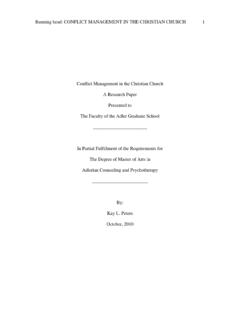Transcription of ANTHROPOLOGICAL PERSPECTIVES Introduction to …
1 Devi Prasad Subedi, MA Sociology, TU Nepal 1 ANTHROPOLOGICAL PERSPECTIVES Introduction to Anthropology Anthropology is the study of human differences, cultural and biological, in the context of human nature. Anthropologists identify and compare behaviour of a particular group against the full range of human behaviour. Such comparison should uncover principles that apply to all human communities. Third World Focus was the distinguishing characteristics of this discipline. Until after the Second World-War, anthropology focused almost exclusively on non-western or 'tribal people'. For a long time, anthropologists assumed that non-European cultures were different enough to justify a different social science discipline to study them. This assumption seems less persuasive today.
2 How are different people in different places similar and different, both biologically and behaviorally? Spotting cultural patterns requires fresh, neutral eyes. Anthropology as a practice of Theory [Michael Herzfield] Anthropology : Critique of Commonsense Social/cultural anthropology is "the study of common sense' - this statement is misguiding. It is neither common to all cultures nor is sensible from the perspective of anyone outside its particular culture. How do we know that human being have really landed on the moon? We are usually convinced of it. How do we know that its not wrong? So, why not study science as an ethnographic object. Anthropology is a discipline that has developed an ironic sense of its own social and cultural context. BUT well equipped to challenge the separation of : modernity from tradition; and rationality from superstition -> because anthropology played the influential role in creation of this antimony.
3 Devi Prasad Subedi, MA Sociology, TU Nepal 2 Anthropology entails the unveiling of intimate practices ranging from 'that's always been our custom' to the evocation of science and logic by every modern political elite. Anthropology provides unique critical and empirical space to examine the universalistic claims of common sense-including the common sense of western social theory. So anthoropology seeks : - field research - intimate perspective - Active involvement - participant observer will not suffice A Sense of Application Anthropology might provocatively be defined as the comparative study of common sense. It can be both applied and academic. It can explore into the universal logic of globalization (applied). In the same time it can historize and contextualize the conventional wisdoms (academic).
4 From common sense to multiple senses Anthropology can be considered as practicing theory to expanded senses. - focus on visualism only. - mental-material debate - we are what we study Anthropology is the critical study of common sense. More intensive focus of anthropology becomes especially valuable. Intimacy of ethnographic research is an important aspect anthropology. Core sub-fields of Anthropology Biology, Forensic, Human Anatomy, Ecology PHYSICAL ANTHROPOLOGY Prehistoric, Historical, Biblical, Urban, Industrial ARCHAEOLOGY LINGUISTIC ANTHROPOLOGY Structural Linguistics, Historical Linguistics, Morphology, Comparative CULTURAL ETHNOLOGY Ecological, Demographic, Social, Political, Devi Prasad Subedi, MA Sociology, TU Nepal 3 Pragmatics, Sociolinguistics Psychological, Medical ANTHROPOLOGICAL PERSPECTIVES Several theories have been propounded in order to study the human differences and explain the aspects of cultures.
5 For example: Culture Theories, Structural Functionalism, Moral economics, Interpretivism, Ecological approach, Marxism, Sociao-biology etc. This creates a variety of lenses for anthropologists. Their explanations vary depending on which theoretical approach they use. Such approach may focus: - on symbols and ideology - on economy and environment - on biology etc. Due to heterogeneity of the theories, it is almost impossible to construct a single perspective that encompasses the variety of ANTHROPOLOGICAL viewpoints. However certain major themes can be synthesized from the existing PERSPECTIVES to Anthropology as follow: - Focus on holism (study of 'all' contexts of human behaviour) - Culture as a central concept - Focus on ethnographical method - Thick description (layers of cultural symbols) - Comparative perspective (cultures) - Cultural relativism - Reflexivity (self-criticism > change) - Emic and Etic Approach (object + Process / internal and external view) - Micro-Macro nexus - Pro-people paradigm (people, their problems and solutions) According to Peacock, there are broadly two elements of theoretical PERSPECTIVES : 1.
6 Study of human behavior (being free from cultural influence) 2. Holistic view ENLIGHTENMENT & POSITIVISM Antiquity, the period of classical Greece and Rome nurtured 3 systems of thought : Theology, Humanism and Science. The systems can be defined in contrast with one another in terms of God, People and Nature: Devi Prasad Subedi, MA Sociology, TU Nepal 4 Theology > People and nature known through God (epic poems of Homer) Humanism > God and Nature known through people (travelogues of Herodotus) Science > God and People known through Nature. (Democritus and early philosophers) Enlightenment, sometimes referred to as the age of reason, refers to the fluorescence of rational intellectual activity in 18th century Europe. Thinkers : Newton, Locke etc. pioneered modern 'social science'.
7 Greatest social theoretical frameworks of the enlightenment incorporated two important 18th century concepts : a. Progress b. Culture European regarded themselves superior from the primitive aboriginal contemporaries. Universal historians of enlightenment period divided human history into 3 stages and attempted to explain how one stage led progressively to the another. In 19th century, this practice was known as 'comparative method' : Gambattista view : 1. god 2. Heroes 3. Men Turgot and Robertson : 1. Hunting [Savegery] 2. Pastoralism [Barbarism] 3. Farming [Civilisation] Enlightenment's basic supposition was that: Human progress is achieved by using human reason to solve human problems. When the French revolution turned out - it signaled end of enlightenment.
8 Positivism is a theory propounded by French sociologist August Comte. [The Course of Positive Philosophy] Comte maintained that human thought progressed through 3 major stages: 1. Theological [phenomena explained in terms of Theological Principles] 2. Metaphysical [phenomena explained in terms of Abstract Principles] 3. Positive [phenomena explained in terms of Phenomena itself] Newton's law of gravitation represented attainment of positive stage in Natural Science. In social science, positive stage lagged behind : Sociology in Middle Ages : Theological [in terms of Christianity] Devi Prasad Subedi, MA Sociology, TU Nepal 5 Sociology in Enlightenment : Metaphysical [abstract principle of Research Progress] Sociology of Comte Age: Positive [Social Phenomenon] Sociology will be nearer to Social Physics.
9 Positivism (with capital 'P') usually refers to his views narrowly constructed. Whereas, positivism (with a small 'p') assumes broader significance that social phenomena should be investigated objectively. DURKHEIM, WEBER AND MARX IN ANTHROPOLOGY Karl Marx Classical Marxism, first proposed by Karl Marx and Frederic Engels, is known as the theory of dialectical materialism. These German sociologists developed this theory in the throes of Industrial Revolution as a means of catching the sources of industrial working class. Dialectics is a process or form of change that operates throughout human history. Hegel assumed that spirit manifests through a sequence of transformation : Thesis > Antithesis > Synthesis Materialism Hegel was idealist and believed that human consciousness determines human existence.
10 Marx and Engels "Stood Hegel on his head" and applied his concept to the material world. Marx believed that human existence determines human consciousness. Concept of Class Struggle : Humanity has been organized into opposing economic classes with unequal access to the 'means of production' or material resources for making a living. The superordinate ruling class controlled the means of production while other oppressed class was subordinated. In order to maximize profit, burgeois capitalist attempted to minimize costs, including cost of labor. Paid less to workers, they could spend less for goods. Capitalist over production and under-consumption would lead to recession, depression and labor unrest. Devi Prasad Subedi, MA Sociology, TU Nepal 6 Despite the global expansion of capitalism, the labor unrest would weaken it and prime it for collapse.




